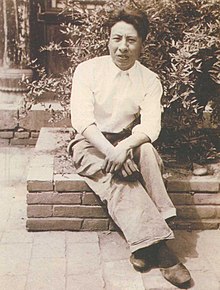| Xia Nai | |||||||||
|---|---|---|---|---|---|---|---|---|---|
| Chinese | 夏鼐 | ||||||||
| |||||||||
Xia Nai | |
|---|---|
夏鼐 | |
 Xia Nai in 1935 | |
| Born | 1910 |
| Died | 1985 (aged 74–75) |
| Occupation(s) | Archaeologist, professor, social scientist |
| Academic background | |
| Education | Tsinghua University University College London |
| Academic advisors | Li Ji |
| Academic work | |
| Discipline | Archaeology, Egyptology, economic history, social science |
| Sub-discipline | Archaeology of China, Chinese history |
| Institutions | Central Museum Academia Sinica Zhejiang University Chinese Academy of Sciences Chinese Academy of Social Sciences |
Xia Nai (Wade–Giles: Shiah Nae; 1910–1985) was a pioneering Chinese archaeologist. He was born in Wenzhou, southern Zhejiang province. He was the second son of Xia Yuyi (夏禹彝) who was a wealthy farmer. Xia was given the first name of Guodong (國棟) but later requested to be named Nai (鼐) and styled himself as Ming (铭) when he became an intellectual upon secondary education.[1] He majored in Economic History at Tsinghua University in Beijing (BA, 1934), winning a scholarship to study abroad. On advice from his mentor Li Ji, he went to University College London and studied Egyptology, earning a doctorate that was finally awarded to him in 1946. In the meantime, he had returned to China joining the staff of the Central Museum and then in 1944 joining the Department of Archaeology of the Institute of History and Philology, Academia Sinica (1943–49), becoming acting director in 1948. When the Institute moved to Taiwan in 1949, Xia remained in the mainland, teaching at Zhejiang University for a year before joining the Chinese Academy of Sciences, eventually becoming director of its Institute of Archaeology (1962–82). Before his death, he was First Vice President of the Chinese Academy of Social Sciences (CASS).
When the Cultural Revolution was launched in 1966, Xia was persecuted and suffered public humiliation and hard labor. In 1970, he was sent to May Seventh Cadre School along with other archaeologists, where they had "re-education." Due to a commission, the Institute received from Albania, in 1972, Xia returned to Beijing with his colleagues and resurrected his scholarly career.
Thanks to his contributions to Chinese and world archaeology, Xia was one of the most honoured Chinese scholars in academe, receiving memberships from the British Academy, the German Archaeological Institute, the Swedish Royal Academy of Letters, History and Antiquities, the U.S. Academy of Sciences, the Third World Academy of Sciences, The International Association for Mediterranean and Oriental Studies, etc., among others.
- ^ Xia (夏鼐), Nai (2009). Diary of Xia Nai, Volume 2 (夏鼐日記, 卷二). Shanghai: East China Normal University Press. p. 438.